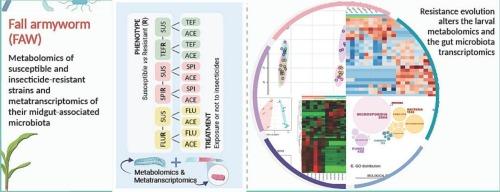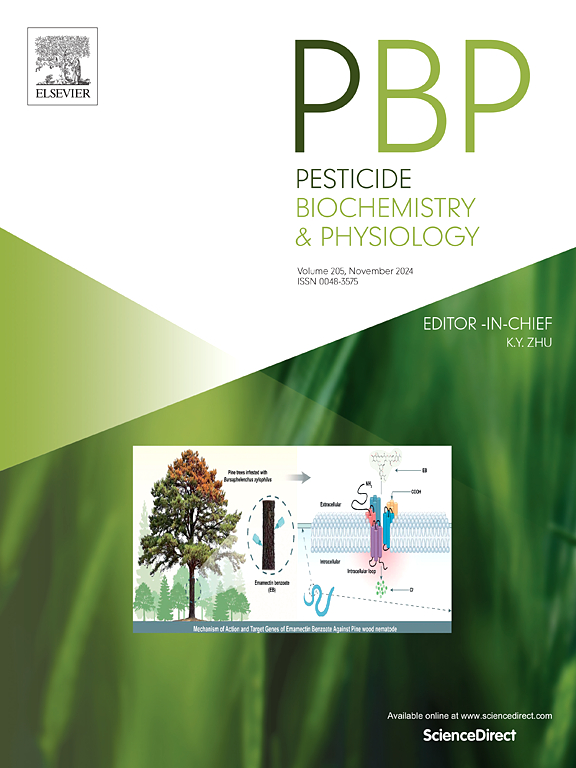Metabolomics of susceptible and insecticide-resistant strains of Spodoptera frugiperda (Lepidoptera: Noctuidae) and metatranscriptomics of their midgut-associated microbiota
IF 4
1区 农林科学
Q2 BIOCHEMISTRY & MOLECULAR BIOLOGY
引用次数: 0
Abstract
The gut microbiota of insects can influence host physiology and, like the host, can be affected by stressors. In this study, we investigated the effects of insecticide exposure on the metabolome and gut microbial metatranscriptome of insecticide resistant and susceptible Spodoptera frugiperda larvae. Metabolomic analysis revealed distinct metabolic profiles influenced by host phenotype and treatment with three insecticides: flubendiamide, spinosad and teflubenzuron. Amino acids, monosaccharides and fatty acids were prominent among the differentially abundant metabolites. Insecticide exposure altered the interactions between the host and its microbiota in an insecticide-dependent manner. Phenotype emerged as an important factor influencing the metabolic profile of S. frugiperda in response to insecticide exposure. For certain metabolites, this influence is observed constitutively, independent of treatment. This study highlights the role of members of the gut microbiota contributing with metabolites involved in host detoxification. In addition, it demonstrates that insecticide exposure and resistance evolution may alter host immunity and its interaction with the gut microbial community. Our findings help to clarify the complex interplay between insecticide exposure, gut microbiota, and host response, and provide insights into the dynamics of the gut microbiota of S. frugiperda in response to insecticides.

水果夜蛾敏感和耐药菌株的代谢组学及其中肠相关微生物群的亚转录组学
昆虫的肠道微生物群可以影响宿主的生理,并且像宿主一样,可以受到压力源的影响。在本研究中,我们研究了杀虫剂暴露对杀虫剂抗性和敏感的夜蛾幼虫代谢组和肠道微生物元转录组的影响。代谢组学分析显示不同的代谢谱受宿主表型和三种杀虫剂(氟苯二胺、spinosad和氟虫脲)处理的影响。氨基酸、单糖和脂肪酸是差异丰富的代谢物。杀虫剂暴露改变了宿主与其微生物群之间的相互作用,以一种依赖杀虫剂的方式。表型是影响frugiperda对杀虫剂暴露代谢谱的重要因素。对于某些代谢物,这种影响是组成性的,独立于治疗。这项研究强调了肠道微生物群成员在宿主解毒过程中代谢产物的作用。此外,这表明杀虫剂暴露和抗性进化可能改变宿主免疫及其与肠道微生物群落的相互作用。我们的研究结果有助于阐明杀虫剂暴露,肠道微生物群和宿主反应之间的复杂相互作用,并为S. frugiperda肠道微生物群对杀虫剂的反应动力学提供见解。
本文章由计算机程序翻译,如有差异,请以英文原文为准。
求助全文
约1分钟内获得全文
求助全文
来源期刊
CiteScore
7.00
自引率
8.50%
发文量
238
审稿时长
4.2 months
期刊介绍:
Pesticide Biochemistry and Physiology publishes original scientific articles pertaining to the mode of action of plant protection agents such as insecticides, fungicides, herbicides, and similar compounds, including nonlethal pest control agents, biosynthesis of pheromones, hormones, and plant resistance agents. Manuscripts may include a biochemical, physiological, or molecular study for an understanding of comparative toxicology or selective toxicity of both target and nontarget organisms. Particular interest will be given to studies on the molecular biology of pest control, toxicology, and pesticide resistance.
Research Areas Emphasized Include the Biochemistry and Physiology of:
• Comparative toxicity
• Mode of action
• Pathophysiology
• Plant growth regulators
• Resistance
• Other effects of pesticides on both parasites and hosts.

 求助内容:
求助内容: 应助结果提醒方式:
应助结果提醒方式:


